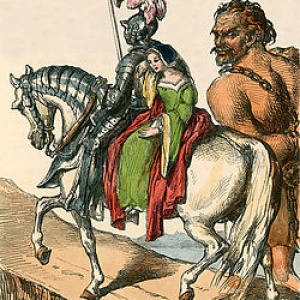Blog
December 21, 2016
What a lot of nonsense
Speakers of Yiddish will be well familiar with the term bobba mayseh. Often mistranslated as “an old wife’s tale” (from bobba = “grandmother” and mayseh = “story”), bobba mayseh a lighthearted, semi-humorous way of saying that something is a lot of nonsense. Researching the origins of various artefacts, one often encounters bobba maysehs of various types, but where does the term itself really come from?
It turns out that the origin of this expression lies in a 13th century Anglo-Norman epic, written in verse and detailing the exploits of Sir Bevis of Hampton. There are lots of similarities between this text and Beowulf, and it was also thought to have served as part of the inspiration for Hamlet. Sir Bevis’ father was a murdered count, whose murderer then went and married his widow. Sir Bevis himself, who was in love with an Egyptian princess, is exiled from his land and is sworn to avenge his father’s death. At one point, he defeats a giant named Ascaparte and makes him his squire.

Sir Bevis leading the giant Ascaparte.
The work was translated into a number of languages (including English in the 14th century), but the most popular one was the Italian (Buovo d’Antona). It was in this form that the work came to the attention of an Italian Jew in the 15th century named Elia Levita, who decided to translate it into Yiddish. His version was enormously popular, and came to be known as Bobba Bukh (“the Bobba Book”). It was the first non-religious text ever written in the Yiddish language, preceding the first Hebrew novel by almost 300 years.
In Levita’s version of the story, in which he supplanted various Christian references for subject matter that would have resonated with a Jewish audience, it is the princess of Flanders with whom the exiled Bobba falls in love and the wicked king of Babylonia who constitutes his nemesis. The Babylonian prince, Lucifer, is promised the beautiful princess, the King of Flanders is taken into Babylonian captivity, Bobba rescues him with the assistance of a magic horse, and the wicked Lucifer is put to death. Twice in the story do Bobba and his lover think the other dead, twice is she almost married to another, and in the midst of all of this excitement he finds the time to return to Antona, banish his mother to a nunnery, kill her murderous husband and become the new king. It’s a real page turner, I am sure.
But already by the 17th century, these stories of mythic tales were ripe for ridicule, and since the epic of Bobba was so well known to Yiddish speakers it came to typify all that was foolish about the genre. A sort of Yiddish Don Quixote, Bobba came to be looked upon as naïve and overly romantic, and started to be used him as a symbol of all that was foolish or unbelievable. Hence, to describe something as a Bobba story (a bobba mayseh) was to say that it was complete nonsense, and this expression is still in use today. That people think it has something to do with grandmothers is perhaps the greatest bobba mayseh of them all.

Author: Education Officer, Simon Holloway.






What’s On Newsletter
Keep up to date on all Museum events and exhibitions.